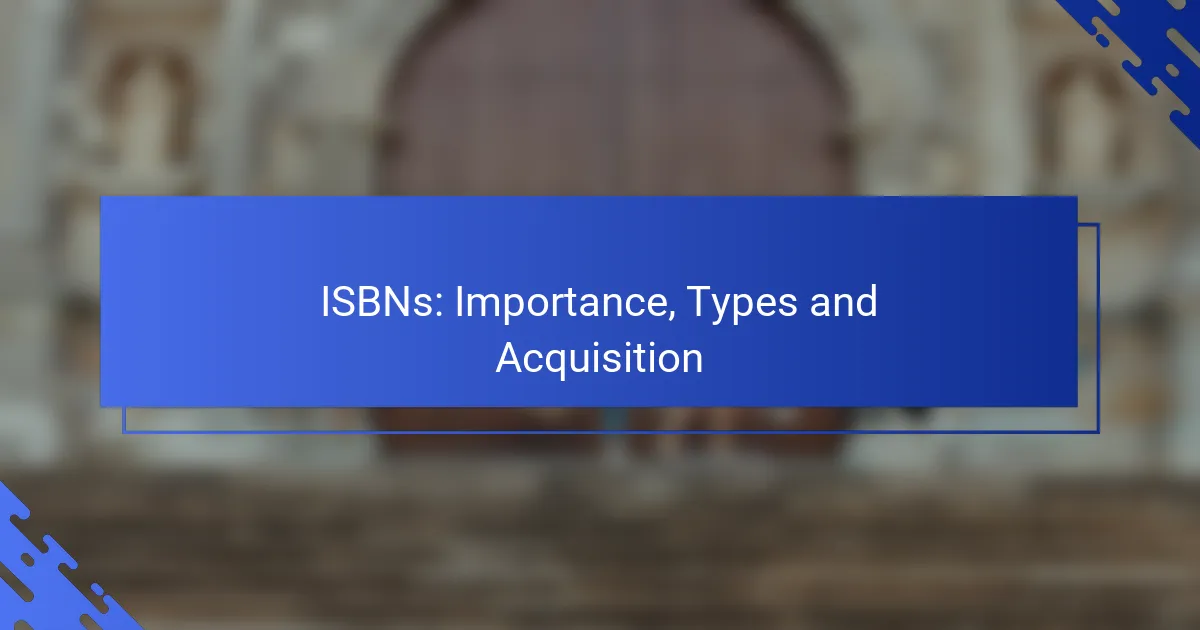ISBNs, or International Standard Book Numbers, are essential for publishers as they provide a unique identifier for books, simplifying sales and distribution processes. There are two main types of ISBNs: the 10-digit and the 13-digit, with the latter becoming the standard since 2007. To obtain an ISBN in the US, publishers must register with Bowker, the official agency, and complete the purchase online.
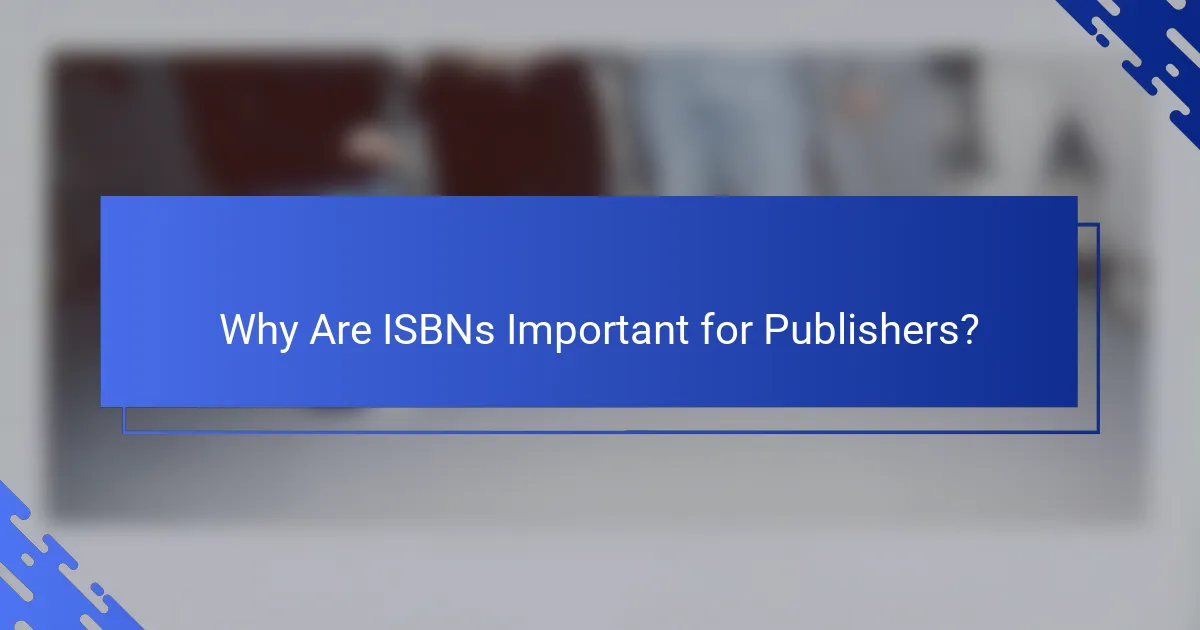
Why Are ISBNs Important for Publishers?
ISBNs, or International Standard Book Numbers, are crucial for publishers as they uniquely identify books, facilitating sales and distribution. They help streamline various processes within the publishing industry, making it easier for retailers, libraries, and readers to find and purchase titles.
Facilitates book sales
ISBNs simplify the sales process by providing a unique identifier for each book, which retailers use to manage inventory and sales. When a book has an ISBN, it can be easily listed in catalogs and online platforms, enhancing its visibility to potential buyers. This leads to increased sales opportunities, as customers can find and order books more efficiently.
Enhances discoverability
Having an ISBN significantly improves a book’s discoverability in both physical and digital marketplaces. Retailers and online platforms use ISBNs to categorize and index books, making it easier for readers to search for specific titles. This can lead to higher sales as more readers can find the books they are interested in.
Streamlines inventory management
ISBNs aid publishers and retailers in managing their inventory effectively. By assigning a unique number to each title, businesses can track stock levels, sales data, and reordering processes with greater accuracy. This reduces the risk of overstocking or running out of popular titles, optimizing inventory turnover.
Supports international trade
ISBNs are recognized globally, which facilitates international trade in books. Publishers can sell their titles in different countries without confusion, as the ISBN ensures that each book is uniquely identified regardless of language or market. This international standardization helps in exporting and importing books seamlessly.
Establishes credibility
Having an ISBN lends credibility to a publisher and its titles. It signals to booksellers, libraries, and readers that the book is professionally published and cataloged. This can enhance the publisher’s reputation and encourage more readers to trust and purchase their books.
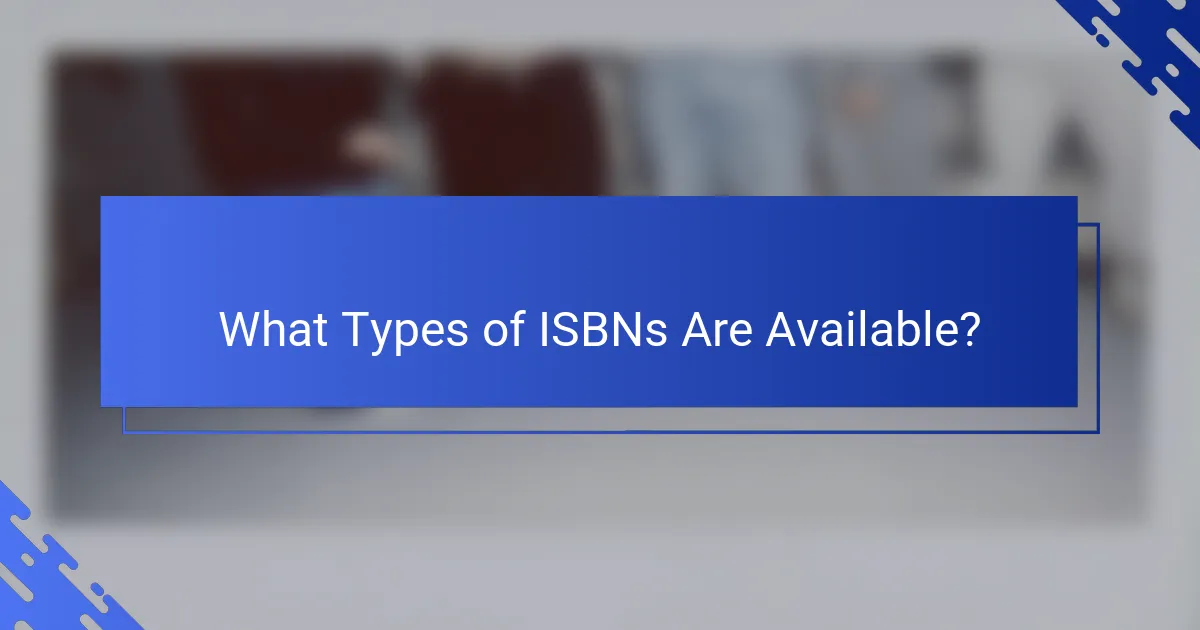
What Types of ISBNs Are Available?
There are two primary types of ISBNs: the 10-digit and the 13-digit ISBN. Each serves to uniquely identify books and other publications, but the 13-digit format has become the standard since 2007 due to its ability to accommodate more titles.
10-digit ISBN
The 10-digit ISBN was the standard format before 2007 and consists of four parts: the group identifier, publisher identifier, title identifier, and a check digit. While still recognized, it is largely being phased out in favor of the 13-digit version.
Books published before January 1, 2007, may still use the 10-digit ISBN, but new publications should adopt the 13-digit format. If you have a 10-digit ISBN, it can be converted to a 13-digit format by adding the prefix “978” and recalculating the check digit.
13-digit ISBN
The 13-digit ISBN is the current standard and includes a prefix (usually “978” or “979”), followed by the group identifier, publisher identifier, title identifier, and a check digit. This format allows for a larger number of unique identifiers, accommodating the growing number of publications.
When acquiring a 13-digit ISBN, ensure that it is registered with an official ISBN agency in your region. This ensures that your book is properly cataloged and can be easily found by retailers and libraries.
ISBN for eBooks
eBooks also require an ISBN to be sold through major retailers and platforms. The ISBN for eBooks is typically a 13-digit number, similar to print books, and helps distinguish different formats and editions of the same title.
When obtaining an ISBN for an eBook, consider whether you will publish in multiple formats (e.g., PDF, EPUB, MOBI). Each format should have its own unique ISBN to avoid confusion in the marketplace.
ISBN for audiobooks
Audiobooks require their own ISBNs, which are also typically in the 13-digit format. This helps differentiate them from print and eBook versions of the same title, ensuring accurate tracking and sales reporting.
When assigning an ISBN to an audiobook, remember that each version (e.g., digital download, CD) should have a separate ISBN. This practice aids retailers and distributors in managing inventory effectively.
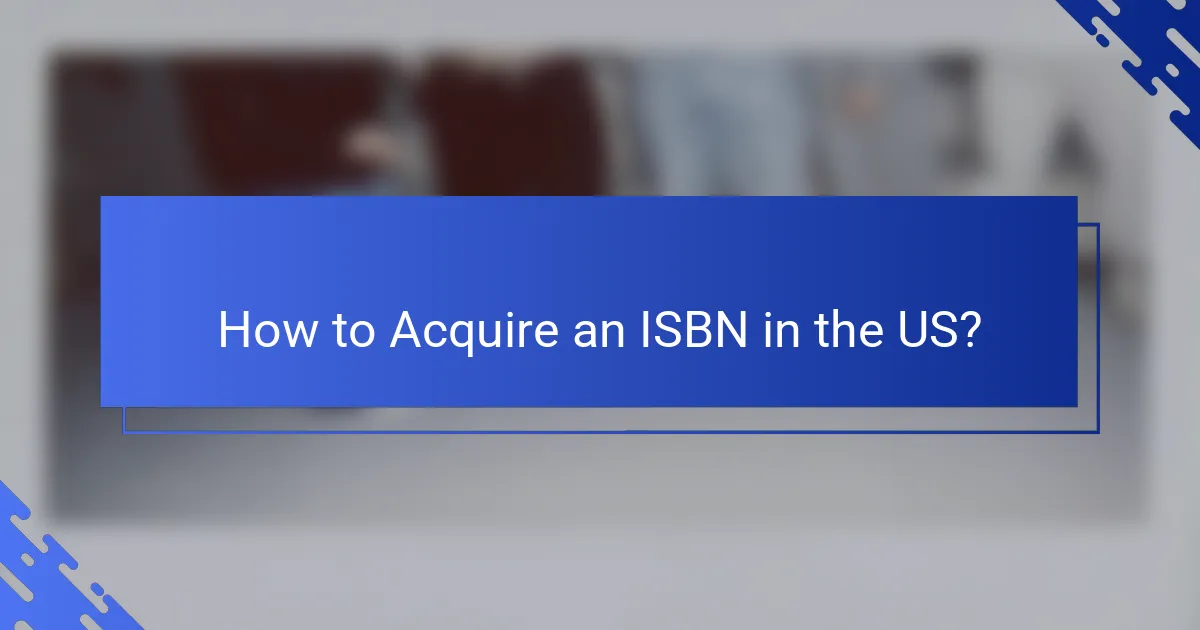
How to Acquire an ISBN in the US?
To acquire an ISBN in the US, you typically need to register with Bowker, the official ISBN agency. This process involves selecting the type of ISBN you need and completing the purchase online.
Register through Bowker
Registering through Bowker is the most common method for obtaining an ISBN in the US. You can create an account on their website, where you will need to provide details about your publishing entity and the titles you plan to publish.
Once registered, you can purchase individual ISBNs or packages. Each ISBN costs around $125 if bought individually, but discounts are available for bulk purchases.
Purchase ISBNs in bulk
If you plan to publish multiple titles, purchasing ISBNs in bulk can be more economical. Bowker offers packages that provide significant savings; for example, buying 10 ISBNs can cost around $295, which reduces the per-ISBN price substantially.
Bulk purchases are ideal for publishers expecting to release numerous books, as they ensure you have enough ISBNs on hand without needing to make repeated purchases.
Apply for free ISBNs via self-publishing platforms
Many self-publishing platforms, such as Amazon Kindle Direct Publishing or IngramSpark, offer free ISBNs when you publish through their services. This option is convenient for authors who do not wish to manage their own ISBNs.
However, using a free ISBN often means that the platform will be listed as the publisher, which may not suit all authors. Consider your branding and distribution needs before opting for this route.
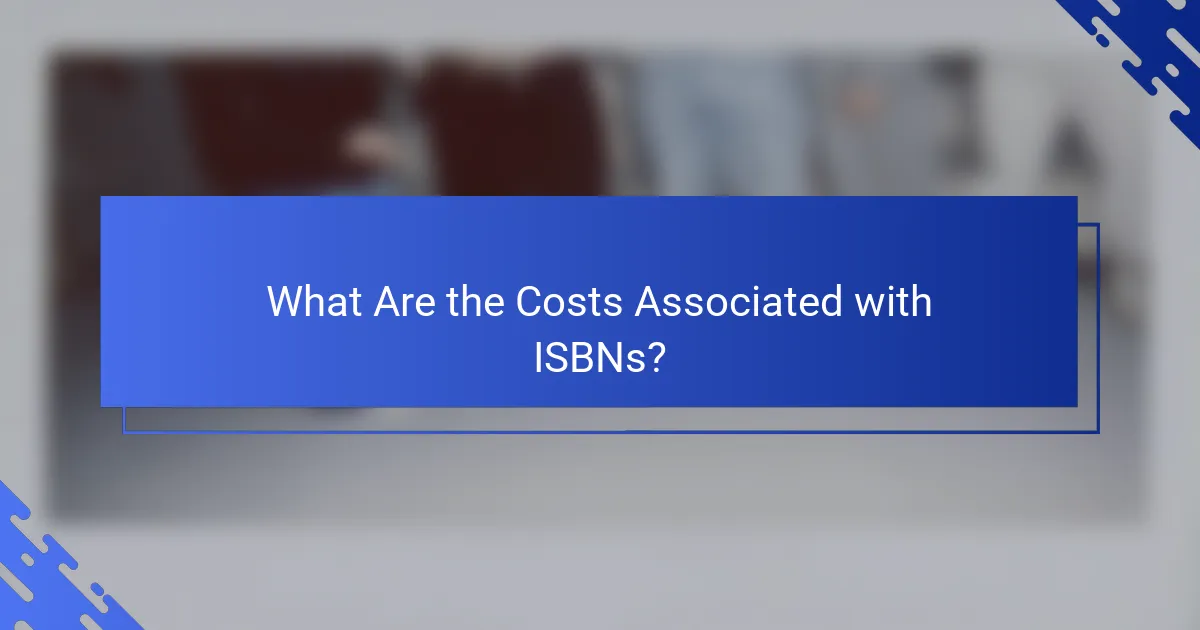
What Are the Costs Associated with ISBNs?
The costs associated with ISBNs can vary significantly based on the purchasing method and quantity. Generally, individual ISBNs can be bought for a nominal fee, while bulk purchases offer discounts that can lower the per-unit cost.
Single ISBN pricing
Purchasing a single ISBN typically costs between $125 and $150 in the United States. This price may vary in other countries, with some charging lower fees. It’s essential to consider that this cost is a one-time fee for the ISBN itself, but additional charges may apply for registration or other services.
Bulk purchase discounts
Buying ISBNs in bulk can lead to significant savings. For example, a block of ten ISBNs might cost around $300 to $400, reducing the cost per ISBN to about $30 to $40. Larger blocks, such as 100 or 1,000 ISBNs, can further decrease the price, making bulk purchases a cost-effective option for publishers with multiple titles.
Free options through platforms
Some platforms, like Amazon KDP and Smashwords, offer free ISBNs for authors who publish through their services. While these options can save money, they often come with limitations, such as restrictions on how the ISBN can be used or the inability to transfer it to another publisher. Authors should weigh the benefits of free ISBNs against the potential drawbacks before deciding.
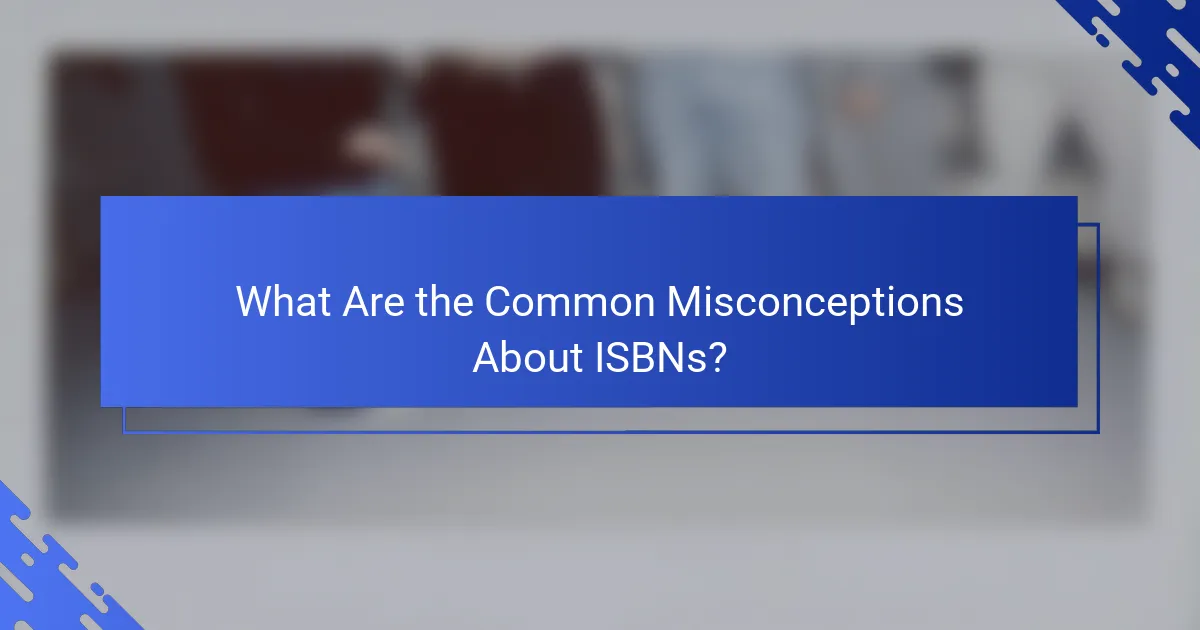
What Are the Common Misconceptions About ISBNs?
Many people believe that an ISBN is only necessary for printed books, but this is not true. An ISBN is essential for any book format, including eBooks and audiobooks, as it helps with distribution and sales tracking.
ISBNs Are Only for Traditional Publishers
One misconception is that only traditional publishers need ISBNs. In reality, self-published authors and independent publishers also benefit from obtaining an ISBN. It provides a unique identifier that helps retailers and libraries catalog and sell the book.
Self-publishing platforms often offer free ISBNs, but these may limit your control over the book’s rights and distribution. Purchasing your own ISBN gives you full ownership and flexibility.
ISBNs Are Expensive and Complicated to Obtain
Another common belief is that acquiring an ISBN is costly and complex. In many countries, including the United States, a single ISBN can be purchased for a modest fee, typically under $100. Bulk purchases can reduce the cost per ISBN significantly.
The process of obtaining an ISBN is straightforward. Authors can apply through their national ISBN agency, often online, and receive their number quickly, sometimes within a few days.
One ISBN Is Enough for All Formats
Some think that one ISBN suffices for all formats of a book. However, each format—print, eBook, and audiobook—requires its own unique ISBN. This differentiation helps retailers manage inventory and sales accurately.
For example, if you release a hardcover, paperback, and eBook version of your title, you will need three separate ISBNs. This ensures that each format is tracked independently in sales databases.
